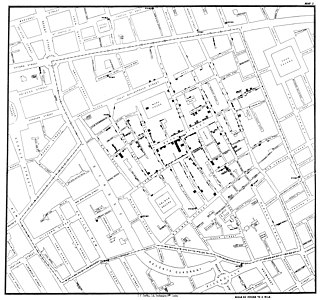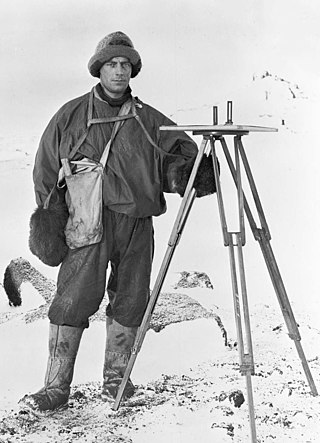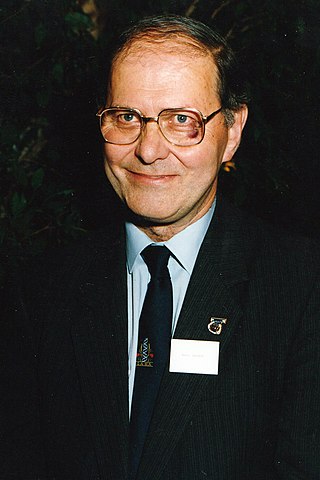
Human geography or anthropogeography is the branch of geography which studies spatial relationships between human communities, cultures, economies, and their interactions with the environment, examples of which include urban sprawl and urban redevelopment. It analyzes spatial interdependencies between social interactions and the environment through qualitative and quantitative methods.

The Cavendish Laboratory is the Department of Physics at the University of Cambridge, and is part of the School of Physical Sciences. The laboratory was opened in 1874 on the New Museums Site as a laboratory for experimental physics and is named after the British chemist and physicist Henry Cavendish. The laboratory has had a huge influence on research in the disciplines of physics and biology.

Aberystwyth University is a public research university in Aberystwyth, Wales. Aberystwyth was a founding member institution of the former federal University of Wales. The university has over 8,000 students studying across three academic faculties and 17 departments.

The Royal Geographical Society (with the Institute of British Geographers), often shortened to RGS, is a learned society and professional body for geography based in the United Kingdom. Founded in 1830 for the advancement of geographical sciences, the society has 16,000 members, with its work reaching the public through publications, research groups and lectures.

David W. Harvey is a British Marxist economic geographer, podcaster, and Distinguished Professor of anthropology and geography at the Graduate Center of the City University of New York (CUNY). He received his PhD in geography from the University of Cambridge in 1961. Harvey has authored many books and essays that have been prominent in the development of modern geography as a discipline. He is a proponent of the idea of the right to the city.

The Department of Earth Sciences at Cambridge is the University of Cambridge's Earth Sciences department. First formed around 1731, the department incorporates the Sedgwick Museum of Earth Sciences.

The Scott Polar Research Institute (SPRI) is a centre for research into the polar regions and glaciology worldwide. It is a sub-department of the Department of Geography in the University of Cambridge, located on Lensfield Road in the south of Cambridge.

Richard John Chorley was an English geographer, and Professor of Geography at Cambridge University, known as leading figure in quantitative geography in the late 20th century, who played an instrumental role in bringing in the use of systems theory to geography.

Frank Debenham, OBE was Emeritus Professor of Geography at the Department of Geography, Cambridge University and first director of the Scott Polar Research Institute.

Sir James Mann WordieCBE FRS FRSGS LLD was a Scottish polar explorer and geologist. Friends knew him as Jock Wordie.
The Victoria Medal is an award presented by the Royal Geographical Society. It is awarded "for conspicuous merit in research in geography" and has been given since 1902, in honour of the late Queen Victoria. Up until then, the society's Patron's Medal had alternatively been known as the "Victoria Medal", and the new medal resembled its original design.
David William Rhind is a British geographer and expert on geographic information systems (GIS). He was Vice-Chancellor of City University, London, until July 2007.

John Riddoch Rymill was an Australian polar explorer, who had the rare second clasp added to his Polar Medal.
Robert Neal Rudmose-Brown was a Scottish academic botanist and polar explorer.

Peter Haggett is a British geographer and academic, Professor Emeritus and Senior Research Fellow in Urban and Regional Geography at the School of Geographical Sciences, University of Bristol.

The University of Cambridge is a public collegiate research university in Cambridge, England. Founded in 1209, the University of Cambridge is the world's third-oldest university in continuous operation. The university's founding followed the arrival of scholars who left the University of Oxford for Cambridge after a dispute with local townspeople. The two ancient English universities, although sometimes described as rivals, share many common features and are often jointly referred to as Oxbridge. In 1231, 22 years after its founding, the university was recognised with a royal charter, granted by King Henry III.
The School of Geography is part of the Faculty of Environment at The University of Leeds based in the UK.
Michael J Kirkby is a British geographer and Emeritus Professor of Physical Geography at the University of Leeds.

The Department of Chemistry is the chemistry department of the University of Oxford, England, which is part of the university's Mathematical, Physical and Life Sciences Division.





















